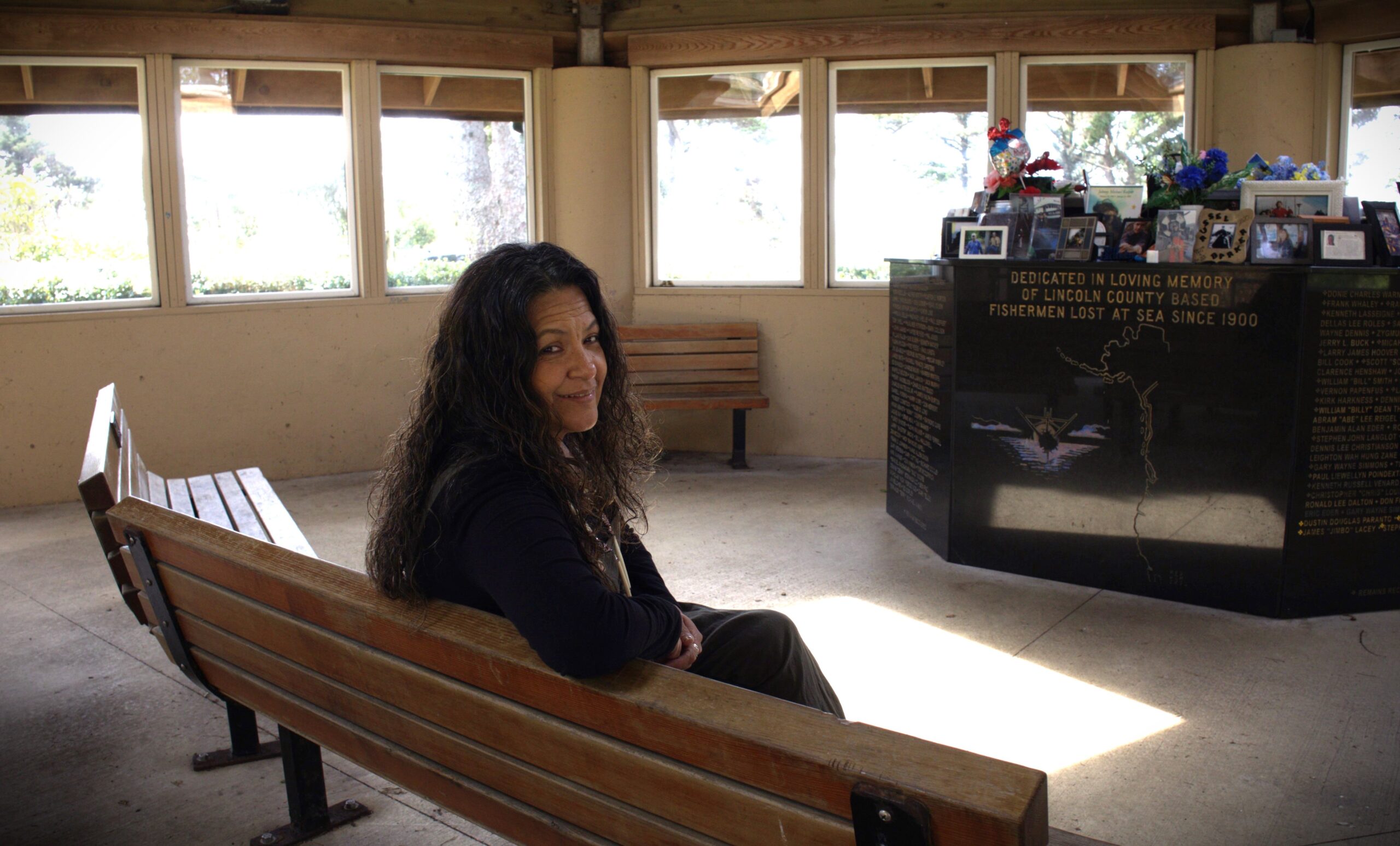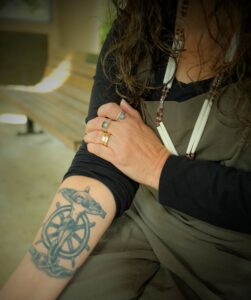
By SYDNE LONG and MALYA FASS/FLUX Magazine
NEWPORT — “One day I’m going to die at sea,” Josh Porter said as he walked into his living room to greet his wife, Denise. He was fresh off a crabbing boat, the fishy, salty smell permeating his clothes.
“You need to be a part of the Fishermen’s Wives,” he said. “They’re the ones that are going to be there for you.”
A year and a half later, on Jan 8, 2019, the crabbing boat Mary B II capsized, pulling Porter, two other crew members and its captain down with it.
Porter made the last-minute decision to join the crew aboard the boat. Others in town warned him of skipper Stephen Biernacki’s history with substance abuse and disregard for harsh weather conditions. Porter, 50, of Toledo believed he could help the man and accepted the job.
It was only Porter’s second trip on the crabbing boat, and a day before he was slated to join a different crew. According to toxicology reports, Biernacki had alcohol and methamphetamine in his system when the boat overturned.
Five years after her husband’s death, Denise Porter stands at the Newport Fishermen’s Memorial on a bluff overlooking the sea that took his life. She visits every other week. Pictures of lost loved ones, candles, birthday cards and bouquets of vibrant daffodils and hydrangeas adorn the memorial. Engraved on its side are the names of approximately 150 Lincoln County fishermen who have died at sea since 1900.
A photo of her husband sits atop the memorial just above the engraved names. Denise Porter reaches out to lovingly dust the dark wooden frame. She is now the vice president of the Newport Fishermen’s Wives — the group that helped her navigate life after losing her husband.
“I became a part of something,” Denise Porter said. “Before I was a part of fishing, I was part of Josh. Now I’m a part of a community.”

54 years of help
Fishing communities all share one thing in common — their dynamics shift when boats leave for months at a time. In Oregon, nearly 1,000 fishing vessels depart from the state each year. Over 300 of those boats touch base in Newport, where many of those left on shore must endure the unpredictability of the fishing industry.
One group supports the unique needs of Newport’s community, their fishermen and their families. The Newport Fishermen’s Wives was established in 1970 and is the only nonprofit of its kind on the West Coast. What was first a social club has become a backbone of the community in the last 54 years.
Co-president Taunette Dixon was raised within the fishing community of Newport and inherited the responsibilities of the generations before her. Growing up, Dixon spent her fair share of time on a fishing boat.
“When I graduated high school, I was shipped off with my grandfather to go fishing for eight months,” said Dixon. “There are so many life lessons you learn when you’re out at sea and there’s no one there to rescue you. If you’re in a fishing family, you usually just kind of have it in your blood.”
When Dixon and her husband decided to have children, her life on land expanded to motherhood. She had two children, Kalli and Kaino.
Dixon’s world turned upside down after she lost her son, Kaino, 28, to a car accident in 2022. She credits the Fishermen’s Wives for helping her through. They surrounded her with love, planned her son’s memorial and left meals at her door for months on end.
“After I lost my son, I thought I really needed to take a break,” she said.

But Dixon didn’t take a break. In fact, her role as a community resource only grew. After losing someone, she knows what grieving families need.
Her home pottery studio doubles as a therapy office of sorts. Inside, sunlight beams through the windows, illuminating shelves stacked carefully with clay vases and mugs. Every surface is covered in clay dust. In the back of the room sit two throwing wheels accompanied by a pair of wooden stools. Porter and Dixon now often sit together, not only to sculpt but to discuss their losses.
“It made me so calm when we talked about our tragedy there,” Porter said. “She can cry. I can cry, and I think there’s so much freedom in crying in front of somebody that isn’t judging you.”
Dixon values having a space she can share with the community. She invites the wives and their children into her studio to create Christmas ornaments every year. It’s an opportunity for the group to be together, outside the heavy work they do.

Banding together
One of the newest members of the organization, Ashlie Freeman, knew nothing about fishing three years ago. Then she fell in love with a fisherman after moving to the coast. She cares for her toddler, Aurora, alone while her husband, George, is away for six months at a time fishing in Alaska.
One day, Freeman met Porter and expressed her difficulty finding friends, more specifically women, who understood what she was going through.

“There’s a lot of people out there that are like, ‘I don’t know how you do it, having your husband gone for that long,’ ” Freeman said. “I’m like, ‘Well, soldiers do it all the time.’ It’s nice to be a part of something where we’re also taking care of our fishermen husbands as well. They’re not just taking care of us.”
Without hesitation, Porter invited her to meet the Newport Fishermen’s Wives who welcomed her with open arms. She is involved with various volunteer groups, such as the Red Cross, Salvation Army and the Newport Food Pantry, but she has never experienced a sense of belonging the way she has with the women.
Over the past year, the treasurer of Newport Fishermen’s Wives, Carrie Brandberg, has become one of Freeman’s closest friends. Freeman does not have a driver’s license, so Brandberg drives her around to run errands, make appointments and attend meetings — something Freeman’s husband does when he is home.
“I think I’d probably go into a depression if I didn’t have this group of women,” Freeman said. “I feel like the more I’m around them, as confident as they are, I want to be that way.”
Now, Freeman is the volunteer coordinator for the Fishermen’s Wives. She helps to organize annual events such as the Fishermen’s Appreciation Day dinner — which is Saturday — and the Blessing of the Fleet, which takes place at the Fishermen’s Memorial Sanctuary gazebo.

In times of tragedy
The memorial not only serves as a meeting place for community events, but a personal place for women like Denise Porter.
Sitting at one of the 12 benches facing the pedestal, she recalled the moment a few years prior, when she sat in the same gazebo in a daze. It was packed with people paying their respects to her husband, just days after his death.

The Fishermen’s Wives organized the memorial service for Josh Porter, so Denise didn’t have to lift a finger. The town showed up for her and gathered around this tragedy. It was the largest turnout for a memorial service they had ever seen.
“At the memorial, I remember one fisherman that came in,” Porter said. “He had fished with Josh on another boat.”
Porter’s face lit up as she remembered the scene.
“He smelled like crap,” she said. “I just remember, he gave me a hug. He had just come running up from the docks and he said, ‘I just got off the boat. I’m sorry.’
“I just said, ‘Oh my God, I miss that smell already.’ It’s comforting, because those are my smells.”
The Fishermen’s Wives taught Porter how to thrive within a tight-knit community. She thought about moving back to her hometown in Washington but decided she had no reason to. Newport is her home now, and despite all she has lost, the wives have given back to her.
“Josh, he was my protector,” Denise Porter said. “He was the person that walked through everything with me, and that’s what they’ve been. They’ve been my Josh.”
- Flux is the University of Oregon School of Journalism and Communication’s official student-produced magazine. Its objective is to deliver compelling feature stories and stunning visuals that reflect the ever-evolving culture of the Pacific Northwest.


